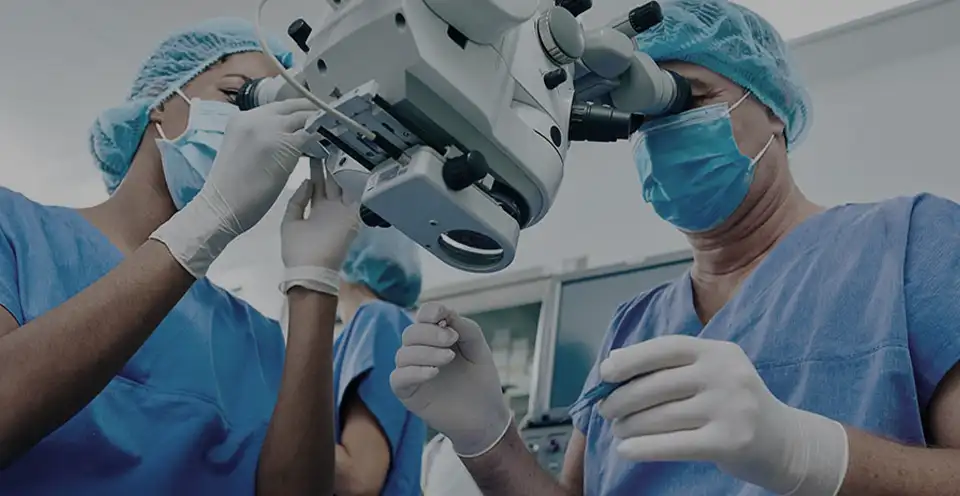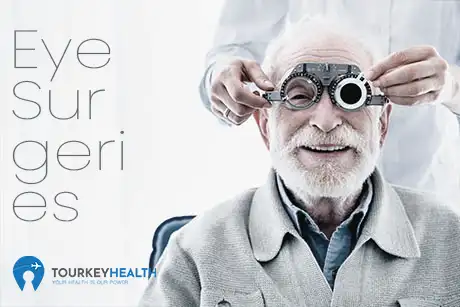What to consider Eye Surgery in Turkey?
Tourkey Health, located in Antalya, Turkey, is proud to offer affordable eye surgery options to help patients improve their vision and eye health. Eye surgery, also known as ocular surgery, is a medical procedure that involves the correction of vision problems or the repair of eye conditions.

There are many different types of eye surgery, including:
- LASIK: LASIK is a type of laser eye surgery that is used to correct nearsightedness, farsightedness, and astigmatism. During the procedure, the surgeon reshapes the cornea using a laser to improve the way the eye focuses light.
- Cataract surgery: Cataract surgery is a procedure that removes the cloudy lens in the eye and replaces it with an artificial lens. This surgery is typically recommended for people with cataracts, which are cloudy areas in the lens of the eye that can cause vision problems.
- Glaucoma surgery: Glaucoma is a group of eye conditions that can damage the optic nerve and lead to vision loss. Glaucoma surgery is used to lower the pressure inside the eye and prevent further damage to the optic nerve.
Tourkey Health is proud to offer VIP services for our eye surgery patients, ensuring a comfortable and stress-free experience. We understand that undergoing eye surgery can be a big decision, and we are here to support you every step of the way.
Antalya, Turkey is a popular holiday destination, making it the perfect place to combine a vacation with your eye surgery journey. Our team of experienced surgeons and eye care professionals will work with you to create a customized treatment plan that fits your specific needs and goals.


Benefits of Eye Surgery
Eye surgery can provide numerous benefits for those struggling with vision problems or eye conditions, including:
- Improved vision: Eye surgery can correct vision problems and improve overall vision quality.
- Improved eye health: Eye surgery can treat and prevent further damage to the eye, improving overall eye health.
- Non-invasive: Many types of eye surgery are minimally-invasive and do not require a long recovery period.
Candidates for Eye Surgery
Eye surgery is typically recommended for people with vision problems or eye conditions that cannot be corrected with glasses or contact lenses. It is important to have realistic expectations about the results of eye surgery, as it may not be suitable for everyone.
At Tourkey Health, our team of experts will assess your vision and overall eye health to determine if you are a good candidate for eye surgery. It is important to consult with a qualified and experienced eye surgeon to determine if this procedure is the right option for you.
Risks and Complications of Eye Surgery
As with any surgery, eye surgery carries some risks and potential complications, including:
- Bleeding
- Infection
- Swelling and redness
- Dry eye
- Difficulty with night vision
It is important to discuss these risks and any potential complications with your surgeon before undergoing eye surgery. At Tourkey Health, we prioritize patient safety and will fully inform you of any potential risks and how to minimize them.
Recovery and Follow-Up Care
Recovery from eye surgery varies depending on the type of surgery and the individual patient. Some types of eye surgery may require a longer recovery period, while others may have a shorter recovery time. It is important to follow the surgeon's instructions for wound care, medication use, and activity level to ensure a smooth and successful recovery.
At Tourkey Health, we provide ongoing support and resources to help our patients during the recovery process and ensure that they are able to achieve the best possible results from their eye surgery.
Don't let vision problems or eye conditions hold you back any longer. Contact Tourkey Health today to schedule a consultation and learn more about your options for eye surgery. Our team is dedicated to helping you achieve your vision and eye health goals.
Common questions about eye surgery in Turkey
What is cataract surgery, and how is it performed?
Cataract surgery is a surgical procedure that removes the natural lens of the eye when it becomes cloudy or opaque due to aging, injury, or disease. The surgeon makes a small incision in the eye and uses ultrasound waves to break up the cloudy lens, which is then removed and replaced with an artificial lens called an intraocular lens (IOL).
What is LASIK surgery, and how does it correct vision?
LASIK is a type of refractive surgery that uses a laser to reshape the cornea, the clear front part of the eye, to correct refractive errors such as nearsightedness, farsightedness, and astigmatism. The laser removes a small amount of corneal tissue to reshape it, which improves the way light is focused onto the retina.
What is a corneal transplant, and why is it performed?
A corneal transplant, also known as a keratoplasty, is a surgical procedure that replaces a damaged or diseased cornea with a healthy donor cornea. It is performed when the cornea is too damaged to be repaired by other methods and can cause severe vision loss or blindness.
What is glaucoma surgery, and how is it performed?
Glaucoma surgery is a procedure that aims to lower the intraocular pressure in the eye to prevent further damage to the optic nerve caused by glaucoma. The most common type of glaucoma surgery is trabeculectomy, which involves creating a new drainage channel in the eye to allow fluid to flow out more easily.
What should I do to prepare for eye surgery?
Before eye surgery, it is important to follow your surgeon's instructions regarding fasting, medications, and other preparations. You may need to stop taking certain medications, such as blood thinners, in the days leading up to surgery. You should also arrange for transportation to and from the surgery center and have someone stay with you for the first 24 hours after surgery.
How long does it take to recover from eye surgery?
Recovery times can vary depending on the type of eye surgery performed. Some procedures, such as LASIK, may have a very short recovery time of just a few days, while others, such as cataract surgery, may take several weeks. It is important to follow your surgeon's instructions for post-operative care and attend follow-up appointments to monitor your progress.
What should I do if I experience complications after eye surgery?
If you experience any unusual symptoms or complications after eye surgery, such as severe pain, sudden vision loss, or excessive swelling or redness, you should contact your surgeon immediately. In some cases, prompt treatment may be necessary to prevent further damage or vision loss.
How soon can I return to work after eye surgery?
The length of time you need to take off work will depend on the type of procedure performed and your individual recovery time. Some surgeries may require several days or even weeks of rest, while others may have a shorter recovery period. It is important to follow your surgeon's instructions for post-operative care and attend follow-up appointments to monitor your progress.
How long will it take for my vision to improve after surgery?
The length of time it takes for your vision to improve after surgery will depend on the type of procedure performed and your individual healing process. Some surgeries may have a very short recovery time, while others may take several weeks or months for full vision improvement. It is important to attend all follow-up appointments and communicate any concerns with your surgeon.
Can I expect any complications after eye surgery?
While complications are rare, they can occur after any surgical procedure, including eye surgery. Some potential complications may include infection, bleeding, inflammation, or changes in vision. It is important to follow your surgeon's instructions for post-operative care and attend all follow-up appointments to monitor your progress and address any concerns.
Click here for more FAQs